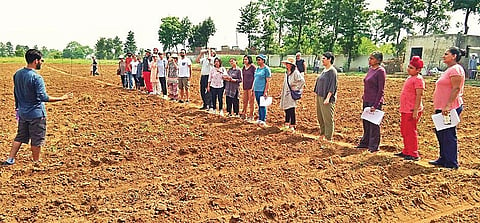

Presently, Kapil Mandawewala and his company Edible Routes have leased three farms across Delhi-NCR. Altogether they are divided into around 200 farmlets (“think of them as your kitchen garden away from home”), and he and his team design and help manage hundreds of urban kitchen gardens (at your home this time), across India’s capital region.
All this takes the patience of a farmer to bring to fruition, but Mandawewala, in his previous career was in the corporate world, having spent a good-ish number of years studying and working all over the US.
“I had sort of lost my zeal for work and I was trying to figure out what I was passionate about and bring my skills to bear to. I was always interested in food and health and the more I thought about it, I realised the way we grow our food is quite damaging to the planet and the people. So I thought, ‘let me start with farming and see where my journey takes me’,” recalls Mandawewala
Luckily his family had some farmland in Gujarat, and in 2008 Mandawewala relocated from the US and began cashing a new crop, so to speak. After four-five years of learning the ways of the soil and stem(s), he began looking at farming in urban spaces. “In March of 2014, I had come down to Delhi where my friend had called me to do a workshop. That’s where the seed of Edible Routes first sprouted, and we registered the company in 2016,” shares Mandawewala.
Later in 2014, Mandawewala also did his first permaculture course. For the uninitiated, permaculture describes an intentionally designed system of agriculture and settlement that aims to reflect the interdependence and self-sustainability of natural ecosystems.
It draws from several disciplines including organic farming, agroforestry, integrated farming, sustainable development, and practical ecology.“Forests don’t ever lie fallow but grow different plants, throughout according to the seasons and other conditions. Similarly, our farmlets and home gardens don’t lie fallow because the variety of crops replenishes the different nutrients of the soil. It’s only when you are growing a single cash crop, you have to let the ground breathe,” notes Mandawewala.It is these lessons that Mandewala and his team now plan to teach across India.
“We want to, and are, partnering with people who have farmlands in different parts of the country and guide them how to create farmlets within their own land. We are creating a model wherein we provide them with the technical guidance, systems and models, and then they manage farmlets for their own local communities, and that way more people can have local farms in their vicinity,” concludes Mandawewala.